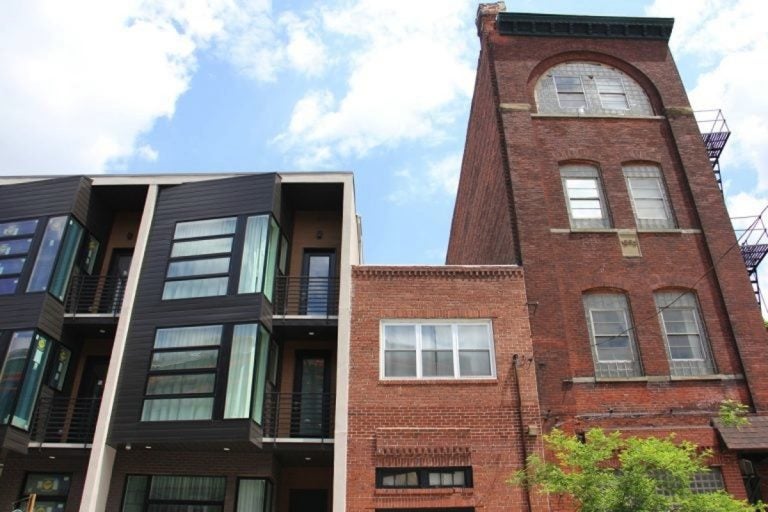Bobby Henon wants to delay abatement reduction to kickstart construction
While city officials focus on hammering out a post-pandemic budget, the development industry and allies are working to hold onto a valuable tax perk.

New houses in Northern Liberties. (Emma Lee/WHYY)
Philly developers are eying workarounds to a planned reduction of the city’s 10-year property tax abatement set to take effect later this year –– and City Council member Bobby Henon is drafting legislation to push that decrease back another year.
The reduction passed after a tough political fight at the end of 2019, effectively would cut the tax perk in half for residential projects over a multi-year phase-in period set to begin December 2020.
Henon’s bill would delay the abatement reduction until December 2021. The bill was reportedly set to be introduced during Council’s Thursday session this week, but that meeting was ultimately canceled.
The Northeast Philadelphia Councilmember said he drafted the bill in order to start “an initial conversation” about kickstarting development as the city heads out of an initial COVID shutdown.
Henon compared the draft to another recent move to delay a plastic bag ban, pitched as a move to help businesses struggling during the coronavirus crisis. He said it was particularly unfair to expect builders with projects already in the pipeline while the city was short-staffed and some boards that help approve construction projects were not able to convene.
“Everything else has been delayed,” he said. “My intention here is to delay the implementation…of reducing the tax abatement.”
Henon, a former electrician who entered politics after rising through the ranks of a local union, was charged last year in a federal case centering on alleged corruption within the union that employed him — the International Brotherhood of Electrical Workers Local 98. Henon has pleaded not guilty in the case, expected to go to trial this year.
Leo Addimando, president of the Building Industry Association of Philadelphia, said his trade group had been in talks with members of City Council prior to the pandemic about the possibility of delaying the planned reduction.
But, while the change to the abatement would not impact city finances during the upcoming fiscal year, Addimando said his group had elected to hold off on lobbying for the delay while the city scrambled to close a $649 million budget gap linked to the COVID-19 shutdown.
“Council needs to get the new budget resolved first before they take up this matter, or other less pressing matters,” Addimando said. “We are not going to be lobbying for an extension on the 10-year abatement until after the budget is passed.”
Still, Addimando said, he and others in the development industry would support the legislation when it is introduced.
City Council member Helen Gym, a prominent critic of the abatement, said she was “opposed to delaying the abatement changes,” as the planned changes had already been pushed back and reduced in scope from initial drafts.
Critics, like Gym, have long slammed the tax break for rewarding developers and new residents over longtime owner-occupants. The 10-year abatement is estimated to cost the city about $109 million in deferred revenue this year, although developers have long argued Philadelphia more than recoups this sum as the result of increased development.
Brett Theodos, director of the Community Economic Development Hub at the Urban Institute, a left-leaning think tank, said developers and prospective home buyers might be lucky to hold on to the perk at all, as cities nationally sought to pare back incentives to avoid layoffs and shore up their long-term financial outlook.
“It’s not very clear whether cities like Philadelphia can afford this sort of tax abatement in the current moment. These abatements are expensive and there’s a lot of demand for municipal revenue right now.” Theodos said. “When it comes to whether they’re going to lay off city workers or give away tax breaks for development, it seems like most places will choose to keep their finances afloat.”
Lobbyists push for other workarounds
While city officials focus on hammering out a post-pandemic budget, the BIA has begun advocating for other policy changes that would help developers tap into the abatement’s full benefits.
One proposal backed by the group would allow developers to obtain a conditional building permit from the city’s Department of Licenses & Inspections before completing other steps that are currently prerequisites for the commencing construction –– approvals from the city’s Water Department or the Civic Design Review board, for example.
As the abatement is triggered by the issuance of a building permit, this shift would enable more developers to tap into the full abatement before the decrease goes into effect, reducing its value.
“We think it would be very fair and reasonable to get more time, or an adjustment to the criteria needed to get a Building Permit, which is the trigger for the full 10-year abatement,” Addimando said.
Karen Guss, a spokesperson for L&I said her office was still assessing the potential implications of that proposal, such as the number of permits that might be issued prior to the deadline and impacts on construction safety.
“L&I informed BIA at the time that it would take the idea under consideration,” she said.
Gym described the proposed change as a “loophole” that should be avoided.
“Our financial assessments are changing on a monthly, if not weekly, basis,” Gym said. “I don’t feel like we can or should commit right now to new loopholes that might obligate us in ways we can’t quite calculate for at this time.”
An ‘unusually generous’ tax benefit at a time of economic crisis
Mike Stillwell, CEO of the development group Streamline, describes Philadelphia’s 10-year abatement as a critical tool for getting certain projects off the ground. He said demand for apartments remains robust in the city, but financing projects like these makes less financial sense without the abatement.
Stillwell said a 45-unit apartment his company had built in Fishtown would likely have been sold off as condos without the tax break.
“What I think it’s going to do is drive out affordability. Multi-family rental projects rely on the tax abatement,” he said.
However, Stillwell added that he understood the critiques of the abatement.
“I feel like [the city] is stuck in a hard spot. They’re trying to appease long-term residents who aren’t benefiting from new construction,” he said. “Their home values may be going up, sure. But if they’re not intending to sell their house and move they don’t see much of a benefit from that right now.”
Introduced at a time when the city saw little new construction, Theodos still described Philadelphia’s property tax break as unusually generous when compared to similar incentives in some other big cities.
He said an alternative cost-saving measure could be focusing the abatement only on certain areas of the city where real estate values were too low to justify new construction –– other Pa. cities, including Bethlehem, employ zone-based tax abatement schemes.
Philadelphia’s tax abatement is mostly used in Center City and surrounding gentrified neighborhoods, according to a 2018 report by City Controller Rebecca Rhynhart.
“I do think it’s worth considering whether every neighborhood in the city needs that benefit,” Theodos said.
Editor’s Note: This article was updated after original publication on to include comments from City Council person Bobby Henon.
WHYY is your source for fact-based, in-depth journalism and information. As a nonprofit organization, we rely on financial support from readers like you. Please give today.







